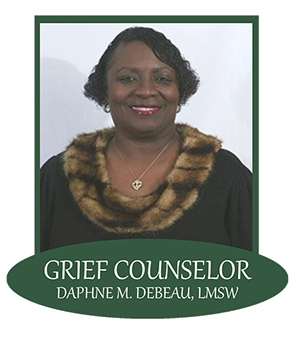Resources

Holding a funeral or memorial service for your loved one is a first step in the grieving process.
Local and national support groups are available to help during this time of transition. These groups provide a comforting environment for expressing emotions through each phase of the grieving process.
To learn more about grief support services, please call us at:
337.942.6750
Funeral Directors Responsibilities
Removal and transferring the deceased from
place of death to the Funeral Home.
Professional care of the deceased
Detailed consultation with family members to gather
necessary information and to discuss specific
arrangements for the funeral service.
File all certificates, permits, affidavits, and
authorizations, as may be required.
Acquire a requested amount of certified
copies of the death certificate.
Compile information and create an obituary
for placement for the family.
Make arrangements with a family's choice
of clergy person.
Make arrangements with cemetery, crematory,
or other place of disposition.
Care of floral pieces and the post funeral
distribution as directed by the family.
Arranging for automobiles, and special services
(fraternal or military) as requested by the family.
Care and preservation of all floral cards, cards,
or other memorial contributions presented to
the funeral home.
Directing the funeral services in a most professional
manner, and in complete charge of the funeral
procession to the cemetery or other
place of disposition.
Assist the family with social security, veterans
insurance, grief counseling, and other
death-related claims.
Family Responsibilities
-Select and contact a funeral home
-Make an appointment to meet with the funeral
director Notify family members, friends,
and business associates
-Gather information that will be included in the obituary
-Notify organizations in which your loved one participated
-Purchase acknowledgment cards, memorial folders, etc.
-Purchase floral arrangements
-Review the loved one’s personal end of life
documents (will, trusts, insurance, financial, etc)
-Complete social security papers and secure
social security benefits
-Secure Veterans benefits (if applicable)
-Secure life insurance benefits (if applicable)
FREQUENTLY ASKED QUESTIONS
Why should I plan a funeral for my loved one?
A funeral or memorial is a customary way to recognize death and its finality. Funerals are held for the living to show respect for the dead and to help survivors begin the grief process. They also give mourners a chance to share stories, create memories, fulfill religious beliefs & customs, participate in a support system, and gather at a peaceful place during a time of confusion and uncertainty.
What tasks are involved in arranging a funeral?
There can be as many as 200 tasks when planning a funeral. Many of them are listed below. After meeting with you at a private consultation, our Funeral Director will coordinate many of these for you and assist you in completing others.
What do funeral directors do?
Funeral directors are caregivers, advisors, and administrators. They make the arrangements for the transportation of the body, complete all necessary paperwork, and carry out the wishes of the family regarding the funeral and final disposition of the body. They have experience assisting the bereaved in coping with death, are trained to answer questions about grief, and can recommend sources of professional help.
Who should be included in the gathering or ceremony?
Family, close friends, co-workers, fellow worshippers, neighbors & acquaintances, and in some cases, the greater community.
What costs are associated with funerals?
The cost of a funeral includes all the services of a funeral director and the funeral home staff, transportation, merchandise, such as caskets and urns, and other services and fees associated with the funeral or memorial service. In general, funeral homes make only a modest profit. We have included our General Price List on our web site for your convenience.
Some people cannot afford basic funeral services. Is financial aid available to the poor?
In addition to family, there are veteran, union, and other organizations that provide benefits to pay for funerals. In some cases this may include, a lump sum death payment from Social Security. In most states, some form of public aid allowance is available from the state, county, or city. Sometimes these allowances can be combined. Most funeral directors are aware of the various benefits and know how to obtain them.
Back to Top



